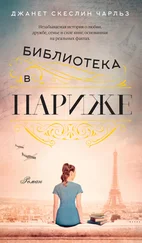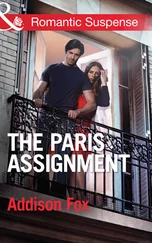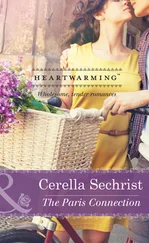“It sounds wonderful,” Mom said dreamily.
Usually, on Sundays after church, Mrs. Gustafson’s shoulders slumped, and her eyes were like the neon sign of the Oasis bar on Monday—unplugged. But now, her eyes were bright. As she spoke of Paris, the angular lines of her face softened, and so did her voice. I wondered why she’d ever left.
Mom surprised me by asking a question. “What was life like during the war?”
“Hard.” Mrs. Gustafson’s fingers tightened around the teacup. When air-raid sirens screeched, her family hid in the cellar. With food rationing, each person received one egg per month. Everyone grew skinnier until she thought they’d just disappear. On the streets, Nazis forced Parisians through random checkpoints. Like wolves, they stayed in packs. People were arrested for no reason. Or small reasons, like staying out past curfew.
Weren’t curfews for teenagers? Mary Louise’s sister, Angel, had one.
“What do you miss most about Paris?” I asked.
“Family and friends.” Mrs. Gustafson’s brown eyes grew wistful. “People who understand me. I miss speaking French. Feeling like I’m home.”
I didn’t know what to say. Silence seeped into the room. It made Mom and me fidgety, but didn’t seem to bother our neighbor, who sipped the last of her tea.
Noticing Mrs. Gustafson’s empty cup, Mom jumped up. “I’ll put the kettle on.”
Halfway to the kitchen, Mom stopped suddenly. She teetered, and one hand shot out, grasping for the cupboard. Before I even thought to move, Mrs. Gustafson leapt to her feet and slipped her arm around Mom’s waist to guide her back to the chair. I crouched beside Mom. Her cheeks were flushed, and she breathed in a slow and shallow way, like the air didn’t want to go into her lungs.
“I’ll be fine,” she said. “I stood too quickly. I know better.”
“Has this happened before?” Mrs. Gustafson asked.
Mom looked at me, so I returned to my chair and pretended to brush away some crumbs.
“A few times,” she admitted.
Mrs. Gustafson called Dr. Stanchfield. In Froid, adults all said the same thing: “In the city, you call a doctor, and he won’t come, no matter how sick you get. Here, the secretary answers by the second ring, and Stanch is at your house in ten minutes flat.” He delivered babies in three counties—the first person to hold many of us in his warm, speckled hands.
He knocked on the door and walked in with his black leather bag.
“You needn’t have come,” Mom said, flustered. She took me to see Stanch if I so much as sneezed, but had never made an appointment for her asthma.
“You let me be the judge of that.” He gently moved her hair aside and held his stethoscope to her back. “Take a deep breath.”
She inhaled.
“If that’s a deep breath…” As Stanch took her blood pressure, he frowned. He said the numbers were high, and prescribed some pills.
Maybe Mom had been wrong when she said it was asthma.
AFTER DINNER, MARY Louise and I sprawled on my carpet to do our reports. “What’d Mrs. Gustafson say?” she asked.
“That the war was dangerous.”
“Dangerous? Like how?”
“The enemy everywhere.” I imagined Mrs. Gustafson on her way to work, the streets full of mangy wolves. Some would growl, some would nip at her high heels. And she kept going. Maybe she never went the same way twice.
“So she had to sneak around?”
“I guess.”
“Wouldn’t it be cool if she was a secret agent?”
“Totally.” I imagined her delivering messages in musty books.
“Speaking of secrets.” She put down her pencil. “I smoked one of Angel’s cigarettes.”
“You smoked by yourself? Did not.”
She didn’t say anything.
“Did not,” I repeated.
“With Tiffany.”
Her words hit me hard. “If you smoke, I’ll never talk to you again,” I said. And held my breath.
We were both twelve, but Mary Louise knew everything first. Because of her sister, Angel, Mary Louise heard about rubbers and keggers. My parents didn’t let me wear makeup, so Mary Louise lent me hers. She was stronger and faster than me, and I felt her sprinting away.
“Didn’t like it that much anyways,” she said.
IN THE COMING weeks, Mom lost her appetite, and her clothes hung loose. Her medicine wasn’t working. Dad took her to see a specialist, who said it was just stress. She was too tired to cook, so Dad made sandwiches. On Thanksgiving, he and I ate our grilled cheese at the kitchen counter. We glanced at the doorway, hoping Mom would feel well enough to join us.
He cleared his throat. “How is school going?”
I had straight As and no boyfriend, and Tiffany Ivers was trying to steal Mary Louise from me. “Fine.”
“Fine?”
“All the other girls get to wear makeup. Why can’t I?”
“A pretty girl like you doesn’t need all that gunk on your face.”
Most of what Dad said didn’t register. I didn’t hear his concern, didn’t hear him say I was pretty. All I heard was the unequivocal no.
“But, Dad—”
“I hope you don’t nag your mother like this.”
For the thousandth time, we both looked at the bedroom door.
BACKPACKS SLUNG OVER our shoulders, Mary Louise and I trudged home from school. We stopped on First Street to pet Smokey the German shepherd, continued past the Flesches’, who had forty-seven ceramic gnomes scattered around their yard, one for each year they’d been married. On the corner lot, old Mrs. Murdoch brushed back her lace curtains. If we cut across her lawn instead of taking the sidewalk, she called our parents.
In Froid, we all shopped at the same grocery store, we drank from the same well. We shared the same past, we repeated the same stories. Mrs. Murdoch wasn’t as mean before her husband keeled over shoveling snow. Buck Gustafson was never the same after the war. We read the same newspaper, we depended on the same doctor. On our way to here or there, we drove down dirt roads, we watched combines roll round the fields, their headers snatching up the wheat. The air smelled clean. Honest. Our mouths and nostrils filled with the tender taste of hay, and the dust of harvest pumped through our blood.
“Let’s move to a big city.” Mary Louise glowered at Mrs. Murdoch. “Where no one knows our business.”
“Where we can do anything,” I added. “Like scream in church.”
“Or not even go to church.”
We paused at this, an idea so enormous it took time to sink in, and walked the last block to my house in silence. From the street, I could see Mom at the window. The reflection on the glass made her seem pale like a ghost.
Mary Louise headed home; I continued to the mailbox and held on to the weathered post, not ready to go inside. Mom used to make cookies and chat with friends at the kitchen counter. Sometimes, she’d pick me up from school and we’d drive to the Medicine Lake Refuge, her favorite place for bird-watching. In the station wagon, Mom and I faced the same direction; the road stretched before us, rich with possibilities. It was easy to confide in her about a run-in with Tiffany Ivers or a bad grade on a test. I could tell her the good things, too, like the time in PE class when Robby was team captain and he chose me first, even before he picked any of the boys. Each time I struck out, they complained bitterly, but he stayed at my side and told me, “You’ll get ’em next time.”
Mom knew everything about me.
At Medicine Lake, there were 270 species of birds. We moved through the knee-high needle-and-thread grass. Binoculars hung from the strap around Mom’s neck. “Maybe hawks are more majestic,” she said, “and piping plovers have the best name. Still, I like robins best.”
I teased her for driving all this way to observe birds that we could find on our front lawn.
Читать дальше
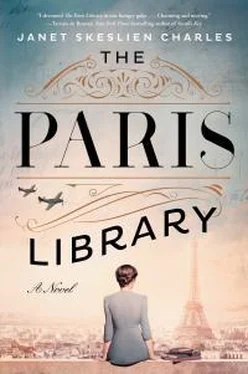
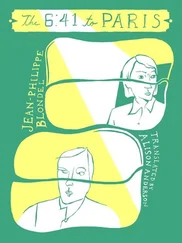
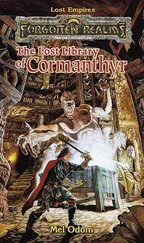
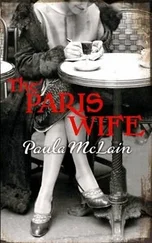


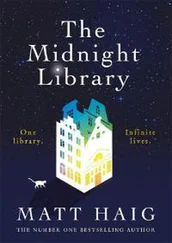
![Джанет Скеслин Чарльз - Библиотека в Париже [litres]](/books/391555/dzhanet-skeslin-charlz-biblioteka-v-parizhe-litres-thumb.webp)
